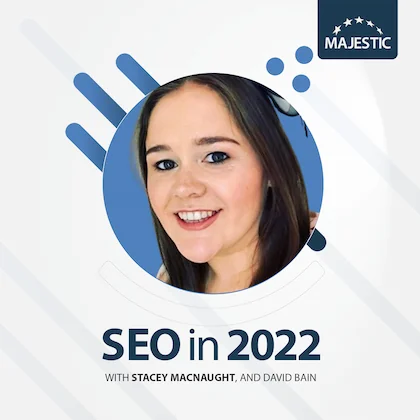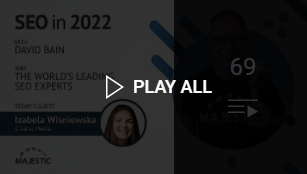-
Site Explorer
- Majestic
- Summary
- Ref Domains
- Backlinks
 New
New Lost
Lost- Context
- Anchor Text
- Pages
- Topics
- Link Graph
- Related Sites
- Advanced Tools
- Author ExplorerBeta
- Summary
- Similar Profiles
- Profile Backlinks
- Attributions
- Compare
-
Link Tools
- My Majestic
- Recent Activity
- Reports
- Campaigns
- Verified Domains
- OpenApps
- API Keys
- Keywords
- Keyword Generator
- Keyword Checker
- Search Explorer
- Link Tools
- Bulk Backlinks
- Neighbourhood Checker
- Submit URLs
- Experimental
- Index Merger
- Link Profile Fight
- Mutual Links
- Solo Links
- PDF Report
- Typo Domain
- Free SEO Tools
-
Support
- Blog

- Support
- Get started
- Tools
- Subscriptions & Billing
- FAQs
- Glossary
- How To Videos
- API Reference Guide

- Contact Us
- About Backlinks and SEO
- SEO in 2024
- Link Building Guides
- Webinars
- Blog
Cut reliance on cold outreach and start thinking about assets that drive inbound links
Stacey MacNaught
Stacey recommends that you build high quality, original content assets - before you try to build links.

Cut reliance on cold outreach and start thinking about assets that drive inbound links
Stacey says: "Stop relying so much on cold outreach. Invest more time in assets that generate their own links over time and can run in the background, while you crack on with something else.
Cold outreach does still work, and people can use it to great effect for landing links. However, with every month that passes, it becomes less and less efficient. Everybody's sick of having inboxes full of it, it's only a matter of time before you're having to send 1000 emails to land one or two decent links. It has diminishing returns as a tactic."
What kind of assets are ideal for driving great links?
"Researching what to produce is very much an SEO task. You need to do keyword research and find out what people are looking for. Statistics content, templates, and free downloadables are particularly effective. In this instance, we're not looking for people who are going to come to the website and buy something, the search intent is different. We're looking for keywords where the search intent implies that they are looking for a resource, or a source to cite. In many areas, those are statistics queries: 'obesity statistics', 'basketball statistics' - pretty much, pick a word and add 'statistics'. You'll find that the top three results for those keywords have natural links pointing back to them, because 'statistics' is the type of keyword that somebody looking for a source to cite is typing in.
It's the same with templates and downloads, and every niche has its own keywords. You need to find keywords where you think the user's intent is to find a source to cite, and then go off and improve it. Look for the keywords that sites already rank for and look at their backlink profiles. That's how you can verify it. A lot of statistics, data pieces, research templates, and things like that are great for driving links."
What specifically does that type of content look like?
"It depends. We just launched an 'insomnia statistics' piece three months ago for a client centred on the UK. We looked at the current top five in the UK for 'insomnia statistics' and analysed their strengths and weaknesses. They were all very in-depth, so we thought ours should be in-depth. Four of them were using US datasets, so we then knew that we could improve relevance by focusing on a UK dataset. Also, the most recent data set was three years old, so we could make ours better by being current. That piece was 1600 words or so, with three different data points, but we've done these with as few as 800 words and as many as 7000. The length of the content will vary from topic to topic.
Eyeball-test the SERPs. We all fall back on tools a lot, but the output of any tool is only as good as what you put in. When analysing content that you're trying to compete with, if it's only a few pages, you need to look up. There's no substitute for a human being looking at what's good, what's not so good, and what you can improve.
It's worth investing time in. Our 'insomnia statistics' piece now has 52 referring domains and it's only three months old. Our first link was from The Times and was established within two weeks with no outreach whatsoever. The initial time investment saves you from time spent on cold outreach later."
Is Google getting better at distinguishing whether data fits a user in a specific country?
"In some areas it's getting better. However, what we see from Search Console for these pieces is that many people search for the location specifically. When the Times journalist found us, our only impressions were from very niche queries, like 'insomnia statistics UK 2021' and 'how many people in the UK have insomnia in 2021'. For users like journalists writing for a UK audience, they will specify that they want UK data. Google is getting better at surfacing local data, where it thinks that might be a requirement, but it's often the user that specifies. For some data the location doesn't matter as much.
It does come down to how much data is available. What we were competing with from the UK was an Aviva study from a few years ago. It had geographical relevance, but it hadn't been updated in years. That was what we had available to us."
Do you do some initial outreach to try and make journalists aware of your content?
"If a site has enough history, it will typically start ranking by itself. You start to rank for long-tail, obscure versions of keywords, build the first few links, then those will help to cement the bigger rankings for headline statistics queries.
For a brand-new site, or one where things are not ranking particularly well, then there are a few options. You can do PPC on big 'statistics' keywords - just until you have the first few links. You can also pull a list of everybody who links to the page you're competing with and contact them. For business websites, or smaller websites, that have published an article more recently that links to older data, get in touch. Tell them you've got a brand-new dataset that answers the question in a different sort of way or has a new take on it. If it's a news website, it's often not worth it - it's okay for them to have archived news using old data on the site, so the chances of them updating a four-year-old article are negligible.
You only really need a couple of links. Give it a couple of weeks to rank by itself. If you come back and it hasn't established any visibility, then try PPC and getting in contact with people."
Should PPC be hyper-targeted to individuals or are you targeting traffic that's relevant to your keyword phrases?
"Mostly we focus on keyword-centric targeting. If someone was typing in 'travel statistics' or 'UK staycation statistics' you've already established that those keywords imply somebody has the intention of finding a resource. You can literally 'Exact Match' target a handful of statistics queries.
Advertisers who are looking for sales, and are potentially negative matching, are using non-commercial queries. Someone typing in 'skiing statistics' is unlikely to be booking a ski holiday tomorrow. Therefore, these are typically low-cost keywords. If there's enough volume to 'Exact Match' on it, then you may only need to do the PPC for a week or two before you've built up a couple of links. Then you can switch it off."
What's an ideal link nowadays?
"Try and replicate what might happen in a natural link building scenario. Google still advises against doing anything with the sole purpose of link building, and we can assume that a Natural Link Profile would be a site that doesn't have to link build. Look at big sites, market leaders and brand leaders like publishing companies. Look at where they're establishing links from.
Consider a market leader in supplements, like Holland and Barrett. From their link profile over the last two years, you can see that they're naturally building links from press for product, press where they give expert commentary, health information assets on their website, and from other business and health websites. Their links are typically international as well. To compete with a brand like that, you need a link profile that is as diverse. You need links to product (usually achieved by PR), links to content assets (usually achieved by statistics work) and links to the homepage (where it's been covered because of something that's been said or done within the business).
Look to replicate what the market leader has, in terms of where links are coming from and what type they are. Mainly, think diversity. What looks like a giant red flag is having all your links coming from a subsection of mum bloggers on a Facebook group running any old content for $30 a time."
Is there an ideal number of statistics-based articles that you would want to publish per year?
"For most of the campaigns that we work on, we're doing anything from three to twelve a year, rarely more than that. Sometimes it comes down to how much scope there is. If you're in healthcare, you could write a statistics or research piece on millions of things. If you're in a more niche sector, there may only be five or six obvious areas with link building opportunity.
Once you've got an established bank, even if it's only five or six pieces, you can invest your time in going back and updating them annually - as opposed to starting again. If you're starting entirely new, you don't need many. A handful of really good pieces will have you covered in most cases."
What is something SEOs should be doing less of to focus on driving inbound links?
"Stop writing posts for random guest spots on random sites. Even if you get an email back from someone saying they'll run your content, think of the time that goes into producing that article to get published on someone else's website, for a link that could be negligible. Stop writing content for small outlets you've reached through cold outreach. Too many companies are spending significant amounts of their copywriting resource doing that. That same copywriting resource could be producing bigger, better assets for your own website."
You can find Stacey over at StaceyMacNaught.co.uk.
Choose Your Own Learning Style
 Video
Video
If you like to get up-close with your favourite SEO experts, these one-to-one interviews might just be for you.
Watch all of our episodes, FREE, on our dedicated SEO in 2022 playlist.
 Podcast
Podcast
Maybe you are more of a listener than a watcher, or prefer to learn while you commute.
SEO in 2022 is available now via all the usual podcast platforms
Don't miss out
Opt-in to receive email updates.
It's the fastest way to find out more about SEO in 2025.
Could we improve this page for you? Please tell us





